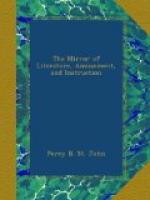In Turkey, no man marries a deformed wife for the sake of a fortune, as with us; beauty and good sense, to their credit be it spoken, are the only inducements to matrimony among the Turks. But they are an indolent people, and are much averse to improving their country by commerce, planting, or building; appearing to take delight in letting their property run to ruin. Alexandria, Tyre, and Sidon, which once commanded the navigation and trade of the whole world, are at present in the Turks’ possession, but are only very inconsiderable places. Indeed, observes a judicious author, it is well for us that the Turks are such an indolent people, for their situation and vast extent of empire, would enable them to monopolize the trade of the world if they attended to it. They appear to possess very little genius or inclination for the improvement of arts and sciences although they live in countries which were once in the possession of the classic Greeks; but seem to prefer a slothful mode of life to an active one, continually sauntering away their time, either among women, or in taking coffee and smoking. Being men of great taciturnity, they very seldom disturb a stranger with questions; and a person may live in their country a dozen years, without having twenty words addressed to him, except on important business. They seldom travel, and have very little wish to be informed of the state of their own, or any other country; when a minister of state is turned out of his place, or strangled, (which is a frequent custom,) they coldly observe that there will be a new one, without inquiring into the reason of the disgrace of the former. The doctrine of predestination prevails, and they therefore think it wicked to endeavour to avoid their fate; frequently entering houses where they know the plague is raging.
All religions are tolerated in Turkey, though none are encouraged but the Mahometan faith. The Christians have churches, which the Turks not unfrequently convert into mosques for their own use; nor will they suffer any new churches, or temples, to be built, without extorting an exorbitant fine from the poor Christians. The high-priest of the Mahometan religion is called the mufti; he is invested with great power, and his seal is necessary to the passing of all acts of state. But any individual, who pleases to take the habit, may be a priest, and may leave the office when he is weary of it; for there is nothing like ordination among them.
G. W. N.
PULQUE.
Pulque, which is the favourite drink of the Mexicans, is extracted from the Manguey, or Great American Aloe; at the time of throwing its flower stem, it is hollowed in the centre and the juice which should have supplied the flowers, is taken from it daily, for about two months; which juice when fermented is immediately fit for drinking. A very strong brandy is obtained by distillation. So great is the consumption that the duty collected at the city gates, amounts annually to 600,000 dollars—From a Correspondent.




